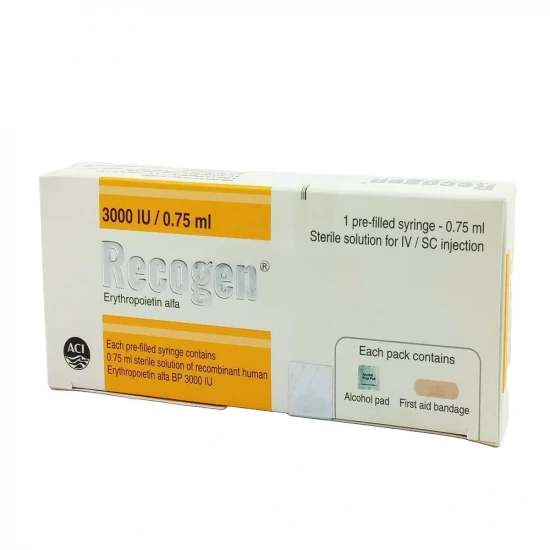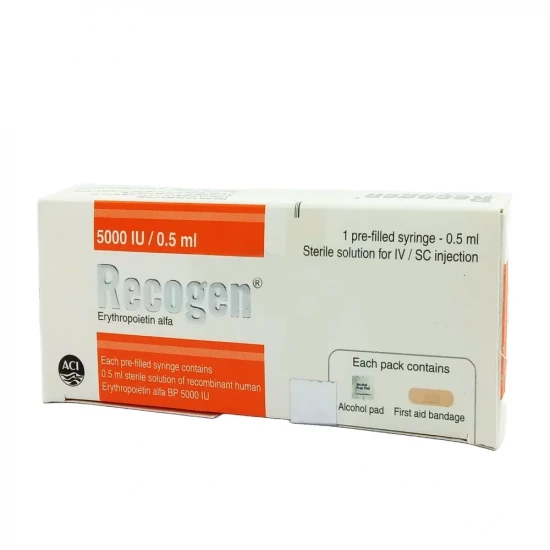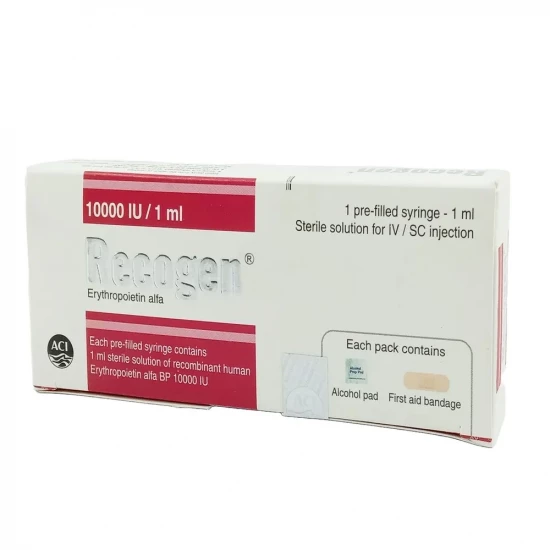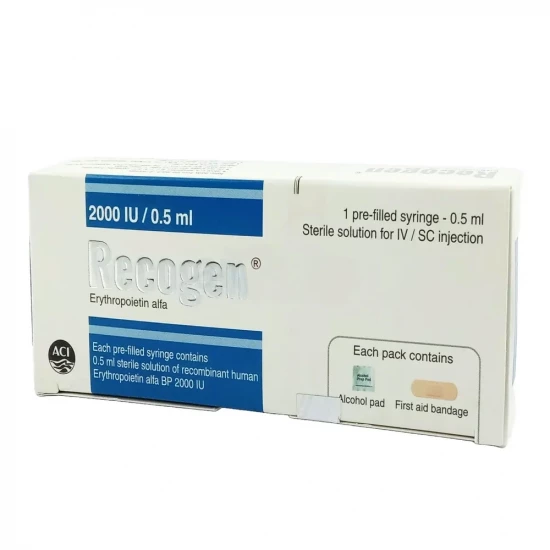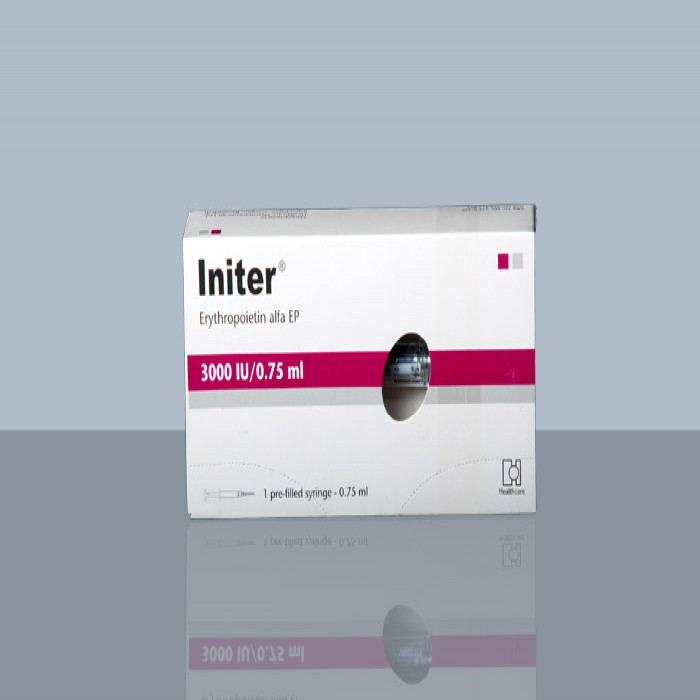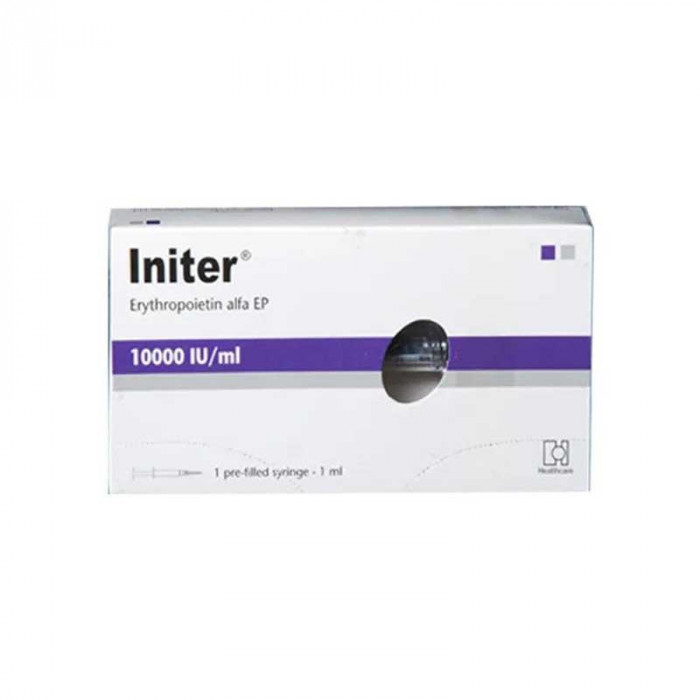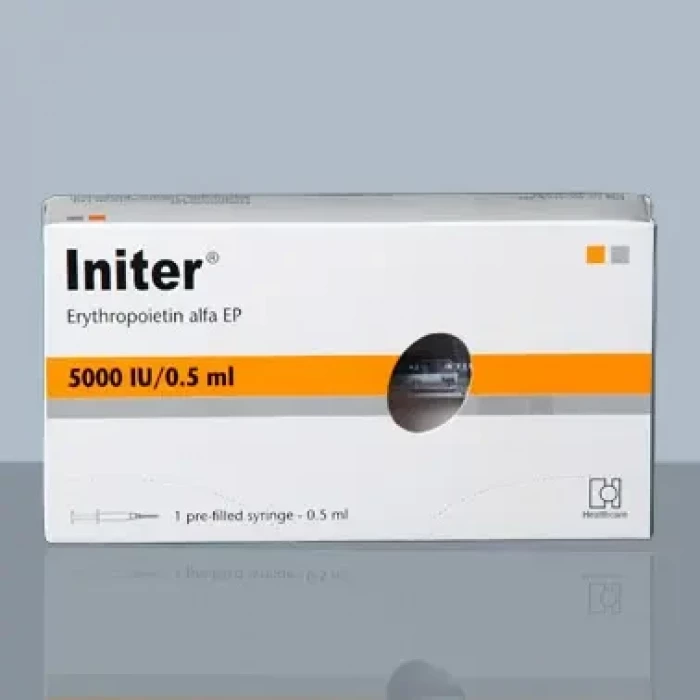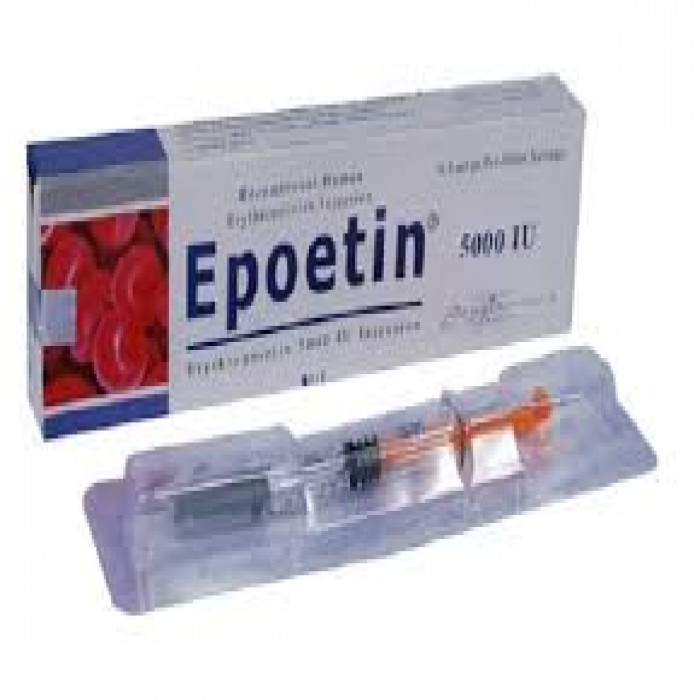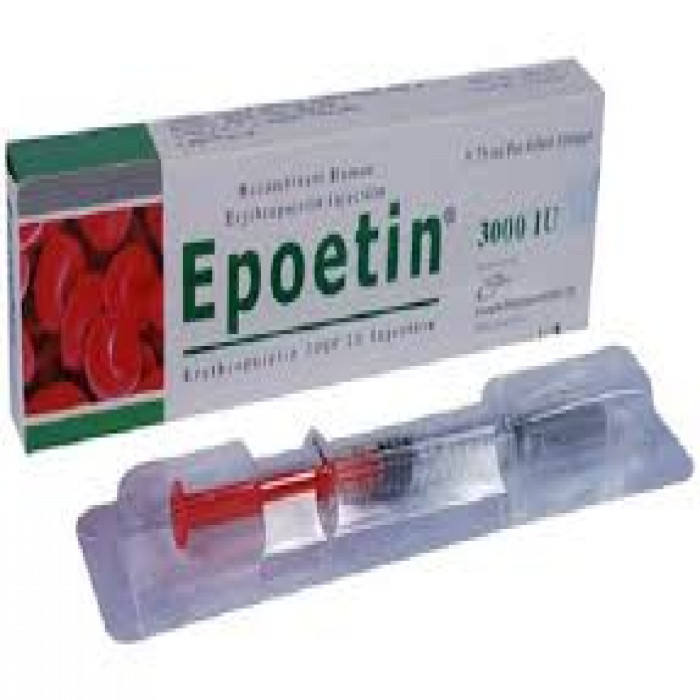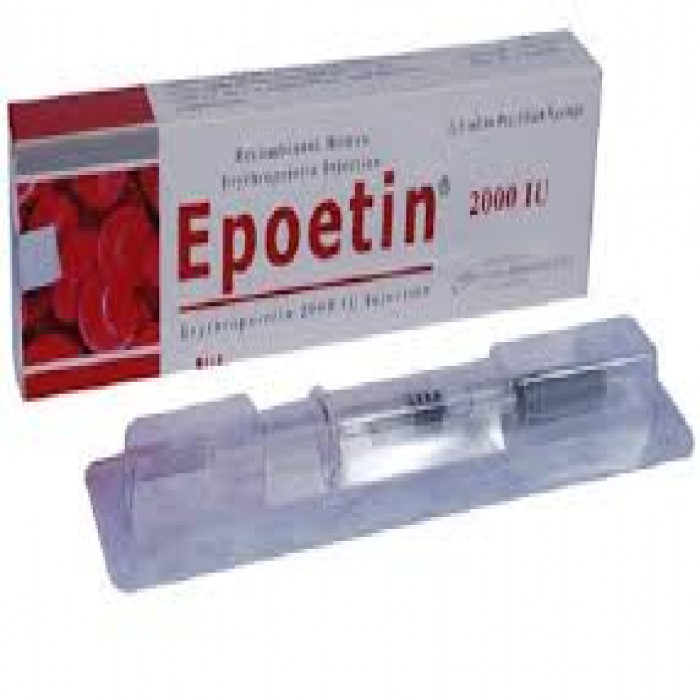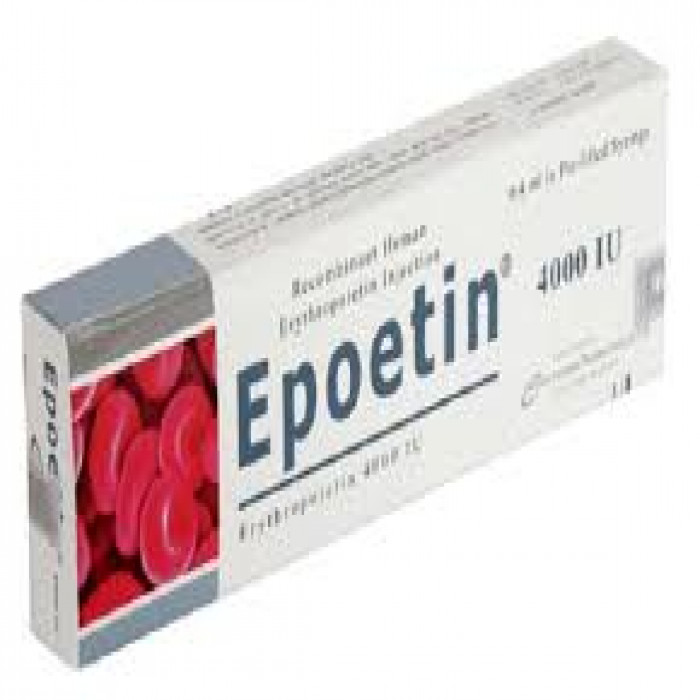
✔ 100% Authentic Product
👁️ Currently Viewing 4540
Epoetin 4000 IU Injection
Erythropoietin therapy, also known as EPO therapy, is a type of medical treatment that uses a man-made form of erythropoietin (EPO) to increase red blood cell production and treat anemia.
Discount
Price: ৳ 1,838
MRP:
৳
1935
5%
Off

100% Genuine Products, Guaranteed

Safe & Secure Payments, Always

Fast, Secure & Efficient Delivery

Proper Packaging
 Cash on Delivery - All over Bangladesh
Cash on Delivery - All over Bangladesh Regular Delivery - 12-24 Hours, Dhaka City* Charge Tk.39-59
Regular Delivery - 12-24 Hours, Dhaka City* Charge Tk.39-59 Regular Delivery - 24-48 Hours, Other Cities* Charge Tk.99-110
Regular Delivery - 24-48 Hours, Other Cities* Charge Tk.99-110
🌙 রমযান অফার 🌙
 ফ্রি ডেলিভারিঃ - ৭৯৯ টাকা+ অর্ডারে, ঢাকা
শহরে
ফ্রি ডেলিভারিঃ - ৭৯৯ টাকা+ অর্ডারে, ঢাকা
শহরে ফ্রি ডেলিভারিঃ - ২৭৯৯ টাকা+ অর্ডারে, ঢাকার
বাহিরে
ফ্রি ডেলিভারিঃ - ২৭৯৯ টাকা+ অর্ডারে, ঢাকার
বাহিরে
📲 মোবাইল অ্যাপ অর্ডারে সাশ্রয় বেশী
-
Google Play Store থেকে ডাউনলোড
-
Apple Store থেকে ডাউনলোড
100% Genuine Products, Guaranteed
Safe & Secure Payments, Always
Fast, Secure & Efficient Delivery
Proper Packaging
 Cash on Delivery - All over Bangladesh
Cash on Delivery - All over Bangladesh Regular Delivery - 12-24 Hours, Dhaka City* Charge Tk.39-59
Regular Delivery - 12-24 Hours, Dhaka City* Charge Tk.39-59 Regular Delivery - 24-48 Hours, Other Cities* Charge Tk.99-110
Regular Delivery - 24-48 Hours, Other Cities* Charge Tk.99-110 ফ্রি ডেলিভারিঃ - ৭৯৯ টাকা+ অর্ডারে, ঢাকা
শহরে
ফ্রি ডেলিভারিঃ - ৭৯৯ টাকা+ অর্ডারে, ঢাকা
শহরে ফ্রি ডেলিভারিঃ - ২৭৯৯ টাকা+ অর্ডারে, ঢাকার
বাহিরে
ফ্রি ডেলিভারিঃ - ২৭৯৯ টাকা+ অর্ডারে, ঢাকার
বাহিরে- Google Play Store থেকে ডাউনলোড
- Apple Store থেকে ডাউনলোড
🌙 রমযান অফার 🌙
📲 মোবাইল অ্যাপ অর্ডারে সাশ্রয় বেশী
✅ Description:
Recombinant Erythropoietin (rEPO):
- Description: rEPO is produced from genetically engineered cells and is identical to the natural form of EPO present in the body.
- Characteristics: It mirrors the structure and function of endogenous EPO.
- Usage: Widely used in medical treatments to increase red blood cell production.
Darbepoetin Alfa (DA):
- Description: Similar to rEPO, but has been modified to have an extended half-life in the body.
- Characteristics: Offers prolonged duration of action compared to rEPO.
- Usage: Employed in situations where sustained EPO activity is required.
Erythropoietin Therapy (EPO Therapy):
EPO therapy utilizes synthetic forms of erythropoietin to boost red blood cell production, treating anemia.
- Primarily prescribed for patients with kidney failure, chronic kidney disease, or anemia resulting from cancer treatments, surgery, significant blood loss, or genetic disorders.
- Before initiating EPO therapy, your doctor will likely conduct various tests including red blood cell count, hemoglobin levels, and comprehensive blood analyses.
- Your doctor will inquire about your current medications and supplements to determine appropriate dosage adjustments.
- Potential risks associated with EPO therapy include hypertension, cardiovascular events (stroke, heart attack), fluid retention, bone pain/weakness, and increased susceptibility to certain cancers, especially with prolonged high-dose usage.
EPO therapy should only be administered under the supervision of a healthcare professional, and patients should be monitored closely for adverse effects.
Safety Advices

Alcohol
UNSAFE
It is not known whether it is safe to consume alcohol with Epoetin 4000 IU Injection Please consult your doctor.

Pregnancy
CONSULT YOUR DOCTOR
Epoetin 4000 IU Injection may be unsafe to use during pregnancy. Although there are limited studies in humans, animal studies have shown harmful effects on the developing baby. Your doctor will weigh the benefits and any potential risks before prescribing it to you. Please consult your doctor.

Breastfeeding
CONSULT YOUR DOCTOR
Epoetin 4000 IU Injection is probably safe to use during breastfeeding. Limited human data suggests that the drug does not represent any significant risk to the baby.

Driving
UNSAFE
Epoetin 4000 IU Injection may cause side effects which could affect your ability to drive.

Kidney
CAUTION
Epoetin 4000 IU Injection is safe to use in patients with kidney disease. No dose adjustment of Epoetin 4000 IU Injection is recommended. Regular monitoring of kidney function tests is advised while the patient is taking this medicine.

Liver
CAUTION
Epoetin 4000 IU Injection should be used with caution in patients with liver disease. A dose adjustment of Epoetin 4000 may be needed. Please consult your doctor.
✔️ Uses of Epoetin 4000 IU Injection
- Anemia due to chronic kidney disease
- Anemia due to cancer chemotherapy
✔️ How to administer Epoetin 4000 IU Injection
Erythropoietin is usually given in the clinical/hospital setting under the supervision of a qualified healthcare professional.
✔️ Side Effects of Epoetin 4000 IU Injection
- Blurred vision
- Bone pain
- Dry mouth
- Anxiety
- Loss of appetite
- Muscle pain or cramps
✔️ How does Epoetin 4000 IU Injection work?
Epoetin 4000 IU Injection is an erythropoiesis-stimulating agent (ESA). It works by stimulating the bone marrow (soft tissue inside the bones which produces red blood cells) to produce more red blood cells.
✔️ Quick Suggestions:
- Epoetin 4000 helps in the treatment of anemia that may have occurred due to chronic kidney disease or cancer chemotherapy.
- It is given as a single injection under your skin.
- Your doctor may get your blood tests done regularly to monitor the levels of hemoglobin, blood cells, and electrolytes such as potassium in your blood.
- Monitor your blood pressure regularly while taking this medication. Inform your doctor if you notice symptoms of very high blood pressure such as severe headache, problems with your eyesight, nausea, vomiting, or fits (seizures).
- Stop taking Epoetin 4000 IU Injection and inform your doctor if you develop shortness of breath or skin rash.
✔️ Indication of Epoetin 4000 IU Injection
- Treatment of anemia associated with chronic kidney disease (CKD).
- Treatment of anemia induced by chemotherapy.
- Management of anemia resulting from anti-viral therapy (e.g., zidovudine).
- Correction of anemia caused by blood donation.
- Management of anemia due to bone marrow disorders or cancers (e.g., myelodysplastic syndromes).
- Prevention or management of anemia in patients scheduled for major bone surgeries (e.g., hip or knee replacement operations).
- Reduction of the potential need for blood transfusion in cancer patients and individuals undergoing bone surgery or chemotherapy.
✔️ Pharmacology
Erythropoietin and epoetin alfa play crucial roles in regulating erythrocyte differentiation and maintaining the appropriate level of circulating erythrocyte mass in the body. When administered, they stimulate the production of red blood cells (erythropoiesis) and subsequently increase the levels of reticulocytes, red blood cells, hemoglobin, and hematocrit.
The response to erythropoietin or epoetin alfa administration typically begins with an increase in the reticulocyte count within 10 days of initiation. This is followed by increases in the red blood cell count, hemoglobin, and hematocrit, which usually occur within 2 to 6 weeks.
The rate of hemoglobin increase may vary depending on the dose administered. In patients undergoing hemodialysis, it has been observed that doses exceeding 300 Units/kg administered three times weekly do not result in a greater biological response.
Epoetin alfa is particularly used to address erythropoietin deficiency in various pathological and clinical conditions where the normal production of erythropoietin is compromised. For example, in anemic patients with chronic renal failure, epoetin alfa administration stimulates erythropoiesis, leading to increases in reticulocyte count, red blood cell count, hemoglobin, and hematocrit, typically within 2 to 6 weeks.
Epoetin alfa has also been found effective in increasing hematocrit levels in HIV-infected patients receiving zidovudine treatment and in anemic cancer patients undergoing chemotherapy.
✔️ Dosage & Administration of Epoetin 4000 IU Injection
Adult Dose:
Chronic Kidney Disease-Associated Anemia (Patient not on dialysis):
- Initially: 50-100 units/kg IV/SC 3 times weekly
- Initiate when hemoglobin level <10 g/dL
- Adjust dose if hemoglobin level >10 g/dL
Chronic Kidney Disease-Associated Anemia (Patient on dialysis):
- Initially: 50-100 units/kg IV 3 times weekly
- Initiate when hemoglobin level <10 g/dL
- Adjust dose if hemoglobin level approaches or exceeds 11 g/dL
Zidovudine-Related Anemia:
- Initially: 100 units/kg IV/SC 3 times weekly
- For HIV-infected patients with endogenous serum erythropoietin levels of <500 milliunits/mL
Chemotherapy-Related Anemia:
- Initially: 150 units/kg IV/SC 3 times weekly
- In patients with non-myeloid malignancies undergoing myelosuppressive chemotherapy for >2 months
Preparation for Surgery With High Risk of Blood Loss:
- 300 units/kg SC once daily for 15 consecutive days
- Alternatively, 600 units/kg SC in 4 doses administered 21, 14, and 7 days before surgery and on the day of surgery
Child Dose:
Chronic Kidney Disease-Associated Anemia:
1 month: 50 units/kg IV/SC 3 times weekly initially
- Initiate when hemoglobin level <10 g/dL
- Adjust dose if hemoglobin level approaches or exceeds 11 g/dL
Prematurity-Related Anemia:
- 25-100 units/kg SC 3 times weekly or 200-400 units/kg SC/IV q24-48hr for 2-6 weeks
Zidovudine-Related Anemia (8 months-17 years):
- 50-400 units/kg SC/IV 2-3 times weekly
Chemotherapy-Related Anemia (5-18 years):
- 600 units/kg IV once weekly; not to exceed 40,000 units
✔️ Interaction
Before receiving Epoetin 4000 IU Injection, it is important to inform your doctor about any medications you are currently taking, including:
- Cyclosporin: This medication is commonly used for immunosuppression in patients who have undergone organ transplantation. Informing your doctor about the use of cyclosporin is essential because it may interact with Epoetin 4000 IU Injection.
- Iron supplements: These medications are used to treat iron deficiency anemia. Inform your doctor if you are taking iron supplements as they may affect the response to Epoetin 4000 IU Injection.
- Other blood stimulants: Epoetin 4000 IU Injection itself is a blood stimulant used to stimulate red blood cell production. However, if you are also taking other blood stimulants such as darbepoetin alfa, it is important to inform your doctor as they may interact with each other or affect your treatment outcome.
- Interferons: Interferons are medications commonly used to prevent or treat certain types of cancer. If you are taking interferons, such as interferon alfa 2A, it is important to inform your doctor before receiving Epoetin 4000 IU Injection as they may interact with each other.
- Ribavirin: Ribavirin is a medication used to treat hepatitis C infection. Inform your doctor if you are taking ribavirin as it may interact with Epoetin 4000 IU Injection.
✔️ Contraindications
Erythropoietin should not be used in certain medical conditions due to potential risks and adverse effects:
- Uncontrolled hypertension: If you have uncontrolled high blood pressure, erythropoietin therapy is not recommended as it may worsen your condition. High blood pressure can lead to serious cardiovascular complications, and erythropoietin may exacerbate this risk.
- Pure red cell aplasia (PRCA): PRCA is a type of anemia characterized by a deficiency in the production of red blood cells in the bone marrow. Erythropoietin should not be used if you have PRCA because it may further suppress red blood cell production and worsen the condition.
- Serious allergic reactions: If you experience serious allergic reactions to erythropoietin, such as anaphylaxis (life-threatening allergic reaction), angioedema (swelling under the skin), bronchospasm (constriction of the airways), skin rash, or urticaria (hives), erythropoietin therapy should be immediately discontinued. These allergic reactions can be severe and require prompt medical attention.
✔️ Pregnancy & Lactation
- Pregnancy Category C. Use during pregnancy only if needed.
- Caution is advised during breastfeeding.
✔️ Precautions & Warnings
- Heart disease or high blood pressure: If you have a heart condition such as a heart attack or high blood pressure, erythropoietin should be taken with caution as it can potentially worsen your condition. It's important to follow all instructions given by your doctor.
- Stroke: If you have experienced a stroke (blockage of blood flow to the brain), use erythropoietin cautiously as it may exacerbate your condition. Follow your doctor's instructions carefully.
- Blood clot: Individuals with a history of blood clots should use erythropoietin cautiously as it may increase the risk of clot formation. Follow your doctor's guidance closely.
- Seizure disorder: If you have a history of seizures or fits, use erythropoietin cautiously as it may worsen your condition. Adhere to your doctor's recommendations.
- Phenylketonuria: Phenylketonuria (PKU) is a metabolic disorder characterized by the accumulation of phenylalanine. If you have PKU, use erythropoietin cautiously as it may have implications for your condition. Follow your doctor's advice carefully.
- Kidney disease: Individuals with kidney disease should use erythropoietin cautiously as it can potentially worsen kidney function. Ensure that you follow your doctor's instructions closely and monitor your kidney function regularly.
✔️ Storage Conditions
In the hospital, pre-filled syringes are stored unopened in a refrigerator between 2 and 8 ℃. If you are using this medicine at home, the pre-filled syringe must be stored in your refrigerator. Do not store it in the freezer. Allow the pre-filled syringe to reach room temperature before using it. This usually takes between 15 and 30 minutes. Recombinant Human Erythropoietin Alfa pre-filled syringes that are being used or about to be used can be kept at room temperature (not above 25°C) for a maximum single period of 7 days. Keep these pre-filled syringes away from children and protected from light.
⚠️Disclaimer:
At ePharma, we’re committed to providing accurate and accessible health information. However, all content is intended for informational purposes only and should not replace medical advice from a qualified physician. Please consult your healthcare provider for personalized guidance. We aim to support, not substitute, the doctor-patient relationship.




